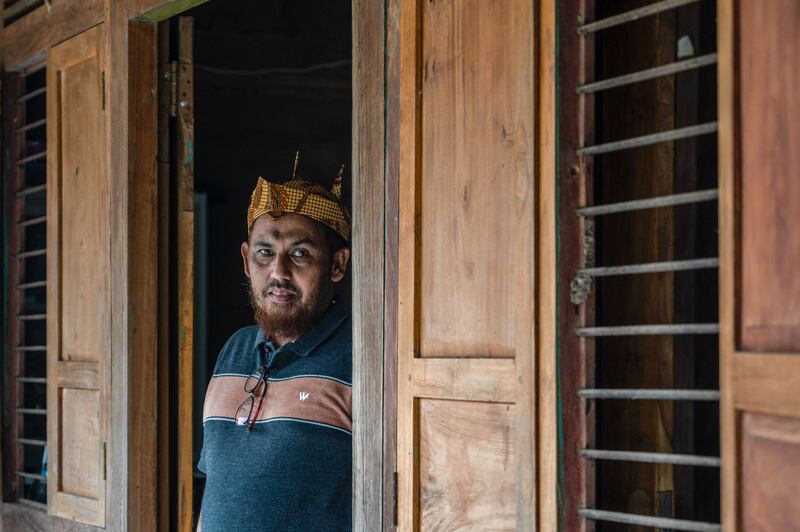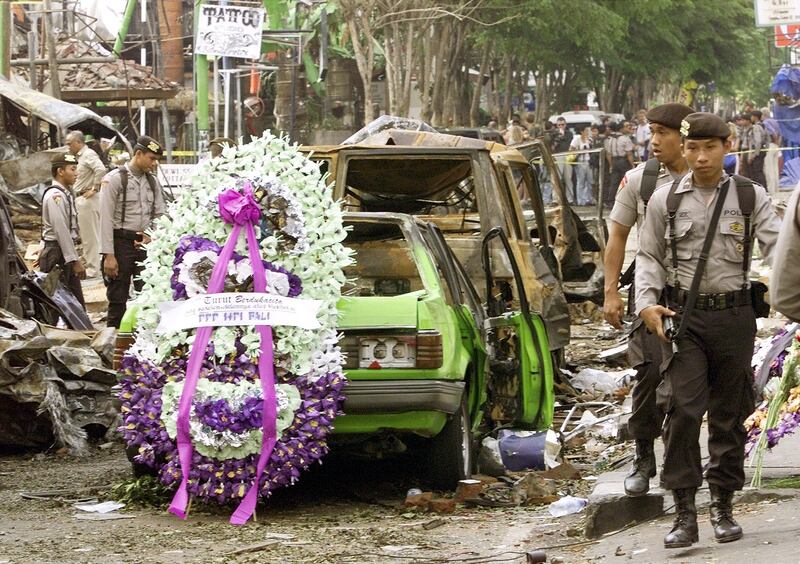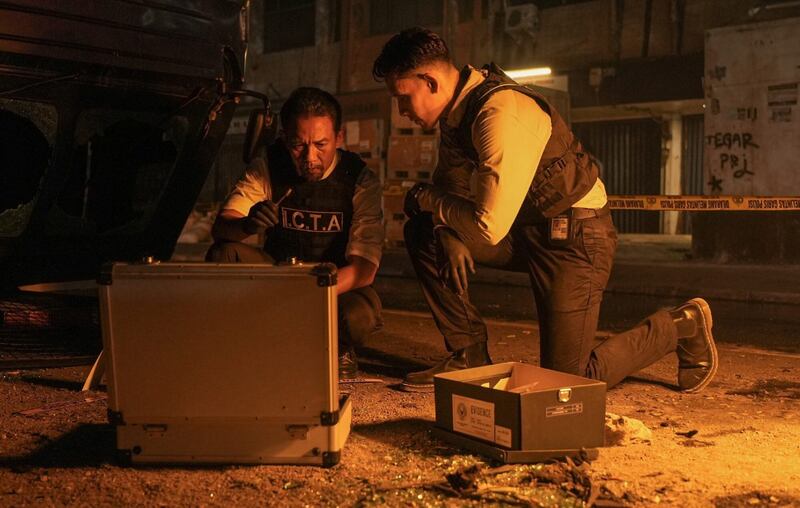Indonesian director Joko Anwar’s new horror film “Siksa Kubur” (“Grave Torture”) begins with a bang as a suicide bomber blows himself up at a bakery, killing the owners and many bystanders.
Joko has said in interviews that the dramatic opening was influenced by real-life events – one being a 2016 attack claimed by Islamic State militants that killed four civilians near a Jakarta shopping center.
In the film released in April, the bomber is portrayed as afraid of being tortured in his grave upon burial – some Muslims believe sinners suffer such a fate – and hopes a suicide attack would help him ascend straight to heaven.
This was the second film in four months that referenced a terror attack in Indonesia. One released in December, “13 Bom di Jakarta” (“13 Bombs”), was loosely based on the attack on the Jakarta Stock Exchange in 2000 by Jemaah Islamiyah (JI), a group affiliated with al-Qaeda, which left 15 people dead
While such strikes have dwindled significantly in recent years, their violence has had an enduring impact on the psyche of many Indonesians.
And while some former militants and terrorism and risk experts credit the government for a drop in such attacks, they caution that the threat remains although channels of radicalization may have changed.

An attack on a police station in neighboring Malaysia on May 17, in which two constables were killed, has caused consternation among security observers in both countries.
They expressed fear that JI, which had been long dormant in Malaysia, may be resurgent because police initially said the suspect may have been a member of the group. He was shot dead by officers during the attack.
The attacker’s father, though, was a known member of JI and the whole episode took place in an area of Johor state known for having allegedly harbored the group’s members in the late 1990s. Police arrested him and four other family members
On Friday, after a week of flip-flops by the Malaysian police – at one point they took back their allegation that the suspect may be a JI member – they rearrested the suspect’s family members under a more stringent national security law. Malaysian police said they needed to investigate the family members further because they “practiced radical ideologies and the father is a JI member.”

According to the man who coordinated the 2002 Bali bombings, which killed 202 people and was blamed on JI, the militant group was left in disarray by the mid-2000s, after the Indonesian authorities clamped down on hardline groups nationwide.
“There is no official leader of JI now. There are still former senior members of the organization, but they have not been able to agree on leadership and there is no one in charge,” Ali Imron, who is serving a life sentence, told BenarNews.
“My understanding is that there was an agreement between them that JI would not continue anymore, and no longer exist as an official organization.”
The Indonesian authorities outlawed JI in 2007, following a series of devastating and deadly bomb attacks dating to 2000.
While JI attacks may have come down, the most devastating terrorist attacks in Indonesia in recent years have been committed by members of groups inspired by the Islamic State group, including IS affiliate Jamaah Ansharut Daulah (JAD), which was founded in 2015. It has since been banned.
The group attacked a number of churches in Surabaya in 2018 and a cathedral in Makassar on the Christian festival of Palm Sunday.
In 2019, a lone attacker in Medan, who was also affiliated with JAD, detonated a bomb at the city’s police headquarters.
Still, there has not been a JAD strike since either.
That could be because of the government’s two counter-terrorism organizations, Densus 88 and BNPT, experts say.
Prior to the Bali bombings, Indonesia did not have specific anti-terrorism legislation, although this was quickly drafted and signed into law in 2003.
Also in 2003, Indonesia formed the elite Counterterrorism Detachment 88 (Densus 88) unit of the police, and received training and funding from the United States and Australia. In 2010, the government’s anti-terrorism body, the National Counterterrorism Agency (BNPT) was established.

Noor Huda Ismail, founder of the Institute for International Peace Building, told BenarNews that he doubts the perpetrator of the recent attack in Malaysia was a formal JI member.
“But, I would not discount the possibility of a terrorist attack in Indonesia, given the latent nature of the terrorist threat in the country,” he said.
“However, it is noteworthy that the Indonesian Detachment 88 has significantly enhanced its understanding of this threat, particularly regarding the activities of JI.”
Yet, Ismail noted that challenges still exist across the region, particularly as radicalization channels diversify.
“Despite the progress, the true challenge lies in combating online radicalization and addressing the potential for recidivism among terrorists who have been released without undergoing comprehensive rehabilitation programs,” he said.
Uday Bakhshi, an operations manager for the risk assessment company, APAC Assistance, said that while there was still a terrorist threat in Indonesia, the government appeared prepared for any attacks based on its recent successes.
“Densus 88 foiled an alleged plot to target the February general elections, and nearly 150 suspected terrorists were arrested in 2023,” he told BenarNews.
In his view, an attack in the near future in the region would be “an outlier.”
“JI has seemingly turned away from violence, and the ISIS supporting groups have lost capabilities and relevance,” he said.

Bali bomber Imron is not the only senior member of JI who now denounces his violent past.
Both Imron and Umar Patek, one of the bombmakers in the 2002 Bali blasts who was imprisoned for 20 years and released in 2022, have become involved in deradicalization programs created by the Indonesian authorities, as has Abu Bakar Bashir, the Indonesian cleric who founded JI in 1993 with fellow Indonesian Abdullah Sungkar.
Bashir was released from prison in 2021 after serving two-thirds of a 15-year sentence for supporting terrorist training camps and has since spoken out about the dangers of radical ideology.
In a video statement sent to BenarNews, Bashir said he “strongly condemned” the killing of the two police officers in Malaysia and was “shocked” by the incident.
“Absolutely, that is not the teaching of Islam. I don’t know if it was just blood-lust, or maybe the influence of the enemies of Islam who were using that young man,” he said.
He added that he wanted to advise “young Muslims” to follow the right path and not get involved in terrorism.
"Those who support Islam should do so only through dakwah (proselytization) and prayers, not through violence or bombs which are not in the teachings of Islam," he said.
